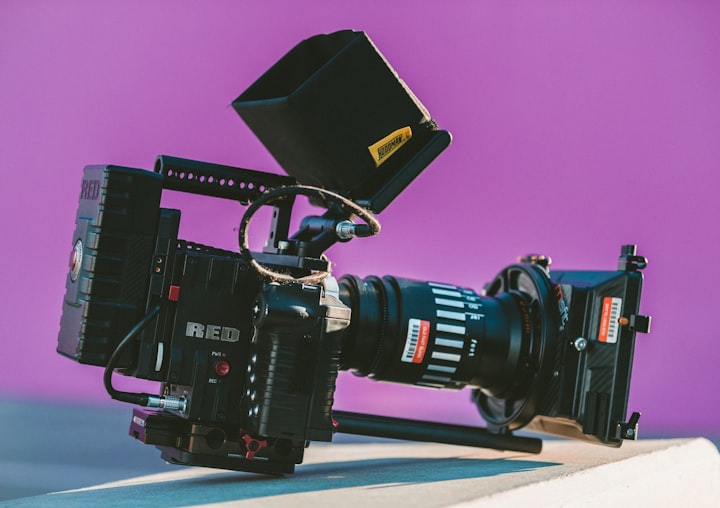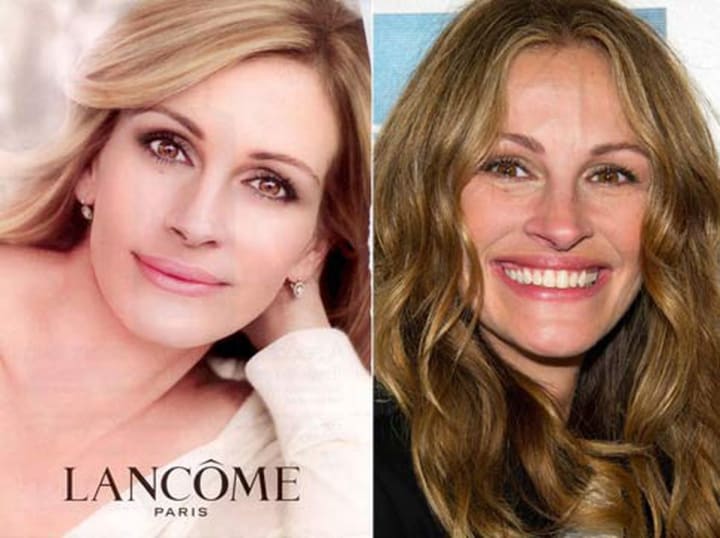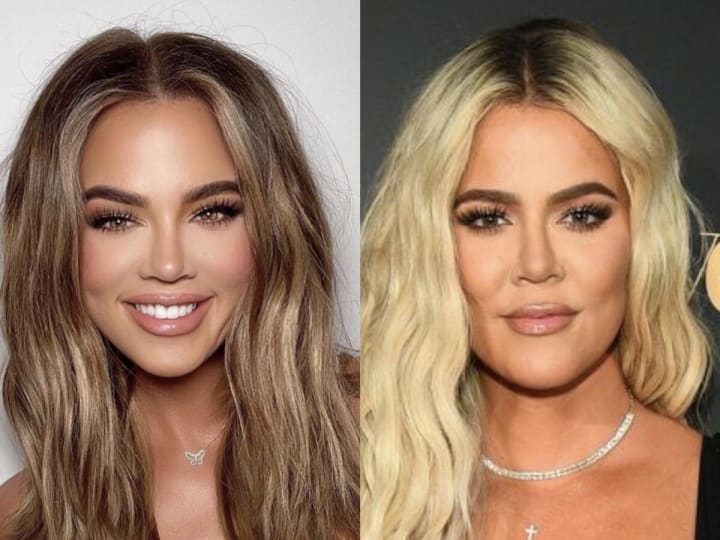Photo Editing: Gone Too Far?
An Investigation

We have all heard a lot of horror stories about editing photos of yourself for the purpose of uploading them to social media for everyone to see how great you look. We have heard about what happens when these go wrong and what has happened in terms of trends: the 'snatched waist' culture, the curves being edited into an hourglass, men editing six packs on to themselves and even people making themselves look smoothed out like a wax model online. The one thing I really want to ask though is that though we know that these are particularly harmful to the younger generation in terms of what they see of others online, we do not actually know how far it really goes.
To this day, advertisers and businesses selling makeup and cosmetics have been under fire for misrepresentation of their products. Over the course of the last year or so, companies such as Dove and others under the Unlever umbrella have been called out for over-editing the models in the photographs they take. Though Dove has preached body positivity and being comfortable in your own skin, this seems like a contradiction to that message. But, again, there are far bigger problems that just editing the smoothness of skin. What actually happens when you misrepresent yourself entirely and how can this do harm in terms of product sales and in terms of what others think of you? - Even more importantly so, how does it change how you view yourself?
Products and the Harm of Misrepresentation

Companies such as Revlon, Johnson and Johnson, L'Oreal and others have been outed as companies that have been photoshopping the quality of their products when it comes to models, advertisements and especially social media in order to make the product seem much better than it is. Obviously, this has fooled some people, even myself from time to time. But it has also caused these labels to be called out for false advertising.
Harming the overall brand image, it does not give a real depiction of what it is like to wear said product. But I think the problem mainly lies in how the CVS has framed this change. They have framed it as an act of transparent beauty in order to help people psychologically rather than directly holding the companies accountable for this.
What then does this do to the communities who follow those representing the product?
When we take the teenagers who like to watch makeup videos on YouTube etc. we can definitely see a fine line between creating a product that stands out on the artist, and creating a product that is made to look downright impossible.
Normally, when looking at a magazine photo or a papparazzi photo of a celebrity, we expect to see the makeup touched up a bit, but making them look completely smoothed over and different is something that misrepresents what they are wearing.
I have done some research and I believe that the most famous one at this point in time is one that was taken of Khloe Kardashian. This is a real shame because not only does she look lovely anyways, but there is an amount of retouching done to the point where the makeup she is wearing has been completely misrepresented because of the smoothing, the reshaping, the resizing and so much more. The question is: would this be okay as an advert for a cosmetic item? and the answer is most likely no.

Vox.com has stated that there is something inherantly harmful about these photographs and it is not only the misrepresentation of cosmetic products, but instead the assumption of the perfect lifestyle through these products and material items. Applications such as FaceTune etc. have given us the ability to take our favourite photographs of ourselves and then photoshop them into oblivion. I am not going to lie, I am too guilty of doing this. If you were to look at my Vocal Profile picture you would see popping colours of makeup whereas, in reality, the makeup is nowhere near as glossy and my hair is not really that black - it is actually a chocolate brown colour. Apart from that, I look the same.
The materialistic value of these products has always been viewed through their ability to make someone look impossibly perfect. The psychology of this is basically 'buy these products too and you can not only look impossibly perfect, but you can also look like you have a great lifestyle and lots of money...' Thus, young people spend money on these items and even if you think you are 'safe' from the influence and out of the loop I can assure you that you are not. Let's go through an anecdote of mine.
Anecdote: Lipstick Culture
When I was about twenty, I got my first Instagram account (which is now, fortunately enough for me, defunct). I would save photographs of things from Instagram that I wanted to buy and mostly, it was makeup products even though I did not actually buy that much makeup beforehand. I noticed I was also wearing a lot more makeup and taking a lot more pictures of myself in said makeup. But I was still far away from retouching my photos.
I was looking at some makeup one day entitled NARS Lipstick. It came in a lovely bottle and though it was liquid, it was a matte red in the brightest and most cinematic red you could think of. The problem was that it was out of my price range. For ages, I was thinking of ways to get this lipstick and then I found another. It was by Christian Dior and it was pink. Now, you can only imagine that this too, was out of my price range and when you put both prices together you got a result that was so far out of my price range I was never going to afford those ever. I had recently spent about £60 on foundation - one bottle. Now, I wanted the lipsticks. Thankfully, I got them for my 21st birthday and yet, I realised that I was actually spending so much on makeup that ever since I owned my Instagram account, my makeup draws had become so full that I now own nearly 200 sticks of lipstick alone.
If we take out the designer ones (there are about five) that is around 195 lipsticks approximately. If we were to price the lipsticks at an average of £5 per stick we would get £975 and the, add on £75 for the designer lipsticks. Yes, it is a grand worth of lipstick. £1'000 worth of lipstick alone.
I have noticed that I am heavily into what I call 'lipstick culture'. We think lipstick is cheap and then we buy a lot of it but then, as we keep buying, the price adds up. We just don't realise it does.
What is the moral that I learnt?
When I was about twenty-three, I stepped away from Instagram for about a year and I realised that my buying of lipsticks had gone down significantly. Not only because I wasn't seeing the products everywhere, but I wasn't seeing photos of celebrities and then, in the caption is stated "Person X is wearing Lipstick Y". Even if the photo misrepresented the product, there was a certain amount of 'requirement' about owning the product that pulled me in. Since getting Instagram back when I was twenty-four, I have toned down my buying of lipstick and have been able to control it better. I now notice when a product is being completely misrepresented.
All in all, owning these things does not make you feel any better, especially when you realise how much you have spent on them.
You Will Never Look Like the Photo and Therefore...
Let's be honest here. You will never look like the professional photograph posted to Instagram. You do not have studio lighting and fifty people working on one photoshoot. You do not have a lens that makes you look ten years younger or ten pounds lighter. You do not have makeup worth the price of your house. So we should not judge our makeup collection and our wants for this lifestyle on the photo of this individual because not only is the lifestyle unattainable. The picture itself is unattainable. We are never going to be celebrity perfect because we cannot pay that much on cosmetics, surgeries, enhancements and more professional makeup and lights. The best thing we can do though, is to post unfiltered pictures of ourselves that directly represent not only the products but ourselves. Our original selves.
About the Creator
Annie Kapur
200K+ Reads on Vocal.
English Lecturer
🎓Literature & Writing (B.A)
🎓Film & Writing (M.A)
🎓Secondary English Education (PgDipEd) (QTS)
📍Birmingham, UK






Comments
There are no comments for this story
Be the first to respond and start the conversation.